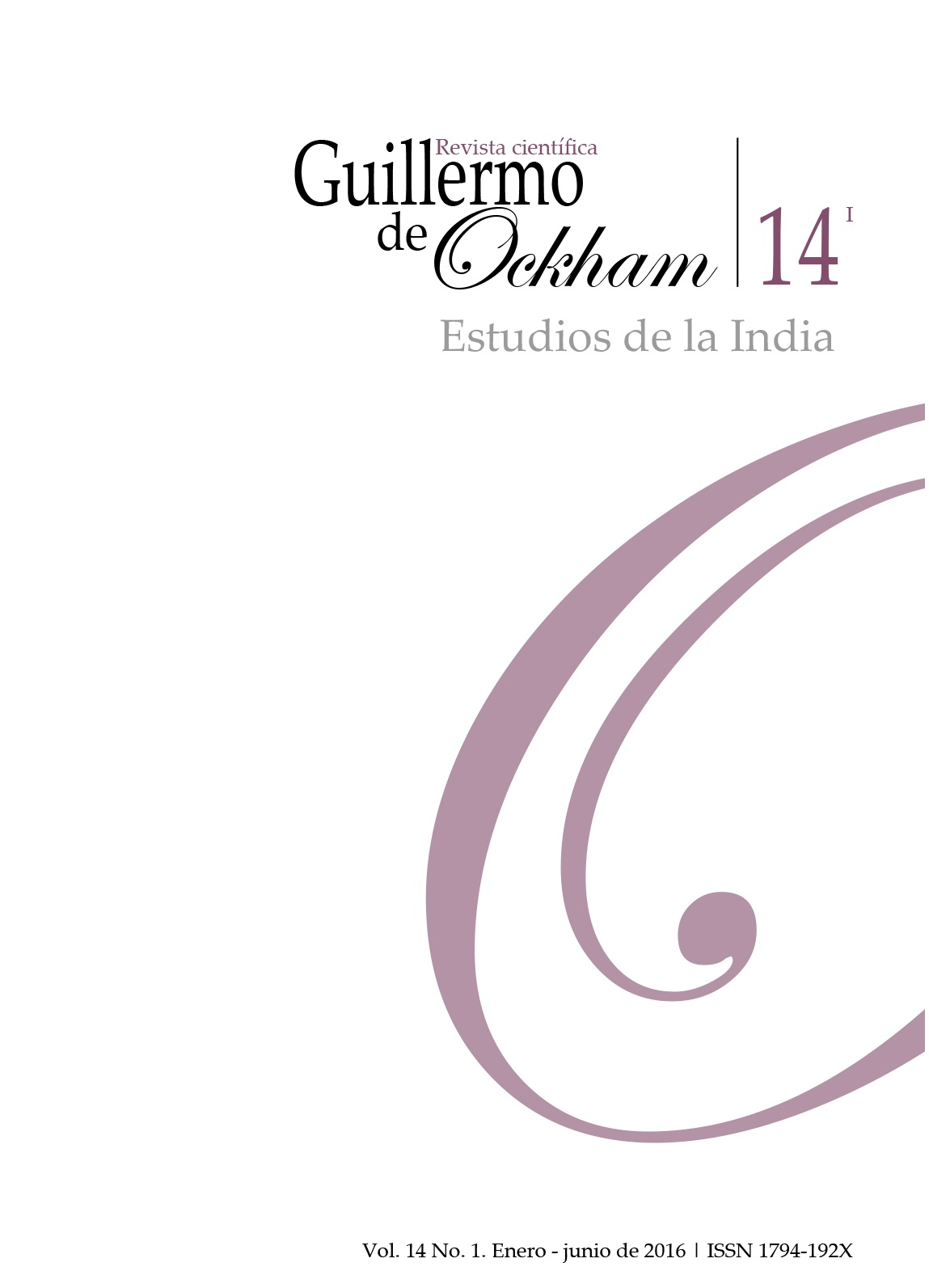La Revista Guillermo de Ockham brinda un acceso inmediato y abierto a su contenido, basado en el principio de ofrecer al público un acceso gratuito a las investigaciones para brindar un intercambio global de conocimiento. A menos que se establezca lo contrario, el contenido de esta revista tiene una licencia con Creative Commons Attribution-NonCommercial-NoDerivatives 4.0 International (CC BY-NC-ND 4.0) http://creativecommons.org/licenses/by-nc-nd/4.0/
- Atribución: debe otorgar el crédito correspondiente, proporcionar un enlace a la licencia e indicar si se realizaron cambios. Puede hacerlo de cualquier manera razonable, pero no de ninguna manera que sugiera que el licenciante lo respalda a usted o su uso.
- No comercial: no puede utilizar el material con fines comerciales.
- Sin derivados: si remezcla, transforma o construye sobre el material, no puede distribuir el material modificado.
- Sin restricciones adicionales: no puede aplicar términos legales o medidas tecnológicas que restrinjan legalmente a otros de hacer cualquier cosa que permita la licencia.
Resumen
A gradual evolution of Brahman in eight successive states is described and criticized in Śaṅkara’s commentary on Bṛhadāraṇyaka-Upaniṣad and in Sureśvara’s and Ānandagiri’s sub-commentaries where the teaching is attributed to Bhartṛprapañca, an ancient Bhedābhedavādin whose commentary on BĀU is now lost. This paper examines fragmentary records of the teaching of Brahman’s evolution and tries to interpret different categories mentioned in different accounts of the teaching by comparing these terms with same or similar categories in other philosophical and religious systems of ancient India in order to understand Bhartṛprapañca’s original eight-fold scheme and its meaning. Tentative conclusion might be that Ānandagiri conveyed Bhartṛprapañca’s scheme literally while Śaṅkara and Sureśvara paraphrased it very freely.
Palabras clave:
Referencias
ĀnSS 16, (1892) Vol 1: ānandāśramasaṃkṛtagranthāvaliḥ / granthāṅkaḥ 16 / bṛhadāraṇyakopaniṣadbhṣyavārtikam / ānandagirikṛtaśāstraprakāśikākhyaṭīkāsaṃvalitam / (tatra saṃbandhavārtikam) etat pustakaṃ ve. śā. rā. rā. kāśinātha śāstrī āgāśe ity etaiḥ saṃśodhitam / tac ca mahādeva cimaṇājī āpaṭe ity anena punyākhyapattane ānandāśramamudraṇālaye āyasākṣarair mudrayitvā prakāśitam / śālivāhanaśakābdāḥ 1814 / Khristābdāḥ 1892.
ĀnSS 16, (1893) Vol 2: … (tatra prathamādhyāyadvitīyādhyāyarūpo dvitīyo bhāgaḥ) … śālivāhanaśakābdāḥ 1815 / Khristābdāḥ 1893.
ĀnSS 16, (1893) Vol 3: … (tatra tṛtīyādhyāyadārabhya ṣaṣṭhāntatṛtīyo ’ntyo bhāgaḥ)… śālivāhanaśakābdāḥ 1815 / Khristābdāḥ 1893.
ĀnSS 15, (1891) ānandāśramasaṃkṛtagranthāvaliḥ / granthāṅkaḥ 15 / bṛhadāraṇyakopaniṣat / ānandagirikṛtaṭīkāsaṃvalitaśāṃkarabhāṣyasametā / etat pustakaṃ ve. śā. rā. rā. kāśinātha śāstrī āgāśe ity etaiḥ saṃśodhitam / tac ca ṃahādeva cimaṇāji āpaṭe ity anena punyākhyapattane ānandāśramamudraṇālaye āyasākṣarair mudrayitvā prakāśitam / śālivāhanaśakābdāḥ 1813 / khristābdāḥ 1891.
ĀnSS 34, (1897) Shrīmat Bhagavadgīta with the Bhāshya by Śrīmat Śankarāchārya, the Commentary by Analagiri on the Same. Ed. Pandit Kāsīnātha Śāstrī Āgāse. Poone: Ānandāśrama Press.
Brahmasūtra with Śaṅkarabhāṣya, Works of Śaṅkarācārya in original Sanskrt, vol. III., Delhi: Motilal Banarsidass (1965, reprint 2007).
Ten Principal Upaniṣads with Śaṅkarabhāṣya, Works of Śaṅkarācārya in original Sanskrt, vol. 1, Delhi: Motilal Banarsidass (1964, reprint 2007).
Secondary sources:
Andrijanić, I. (2015). Quotations and (lost) commentaries in Advaita Vedānta. Some philological notes on Bhartṛprapañca’s 'fragments’. Journal of Indian Philosophy, 43, 257-276.
Dasgupta, S. (1922). A History of Indian Philosophy I-V. Cambridge: Cambridge University Press.
Deussen, P. (1899). Die Philosophie der Upanishad’s, Allgemeine Geschichte der Philosophie, I. 2. Leipzig: F. A. Brockhaus.
Frauwallner, E. (2003). Geschichte der indischen Philosophie, I. Band. Aachen: Shaker Verlag.
Halbfass, W. (1992). On Being and What There Is, Classical Vaiśeṣika and the History of Indian Onthology. Albany: State University of New York.
Harimoto, K. (2006). The Date of Śaṅkara: Between the Cāḷukyas and the Rāṣṭrakūṭas, Journal of Indological Studies, 18, 86-111.
Hino, S., & Jog K. P. (Eds.). (1993). Sureśvara’s vārtika on Puruṣavidha Brāhmaṇa, Delhi: Motilal Banarsidass.
Hiriyanna, M. (1924a). Bhartrprapañca, an old Vedāntin, Indian Antiquary. Mysore: Kavyalaya Publishers.
Hiriyanna, M. (1924b). Fragments of Bhartrprapanca. Proceedings of the All-India Oriental Conference 3, 439-450.
Ježić, M. (1999). Ṛgvedske upaniṣadi. Zagreb: Matica hrvatska.
Jha, G. (1942). Purva-Mīmāṃsā in its Sources. Varanasi: the Banaras Hindu University.
Keith, A. B. (1925). The Religion and Philosophy of the Veda and Upanishads. MA: Harvard University Press.
Mayeda, S. (2006). Śaṅkara's Upadeśasāhasrī Vols I & II. Delhi: Motilal Banarsidass.
Nakamura, H. (2004). A History of Early Vedānta philosophy. Delhi: Motilal Banarsidass.
Olivelle, P. (Ed.). (1998). The Early Upaniṣads. NY: Oxford University Press.
Olivelle, P. (2005). Manu’s Code of Law, A Critical Edition and Translation of Mānava-Dharmaśāstra. Oxford: Oxford Univerisity Press.
Rau, W. (1960.). Bemerkungen zu Śaṅkaras Bṛhadāraṇyakopaniṣadbhāṣya, Paideuma 7, 115-121.
Scharf, P. M. (1996). The Denotation of Generic terms in Ancient Indian Philosophy: Grammar, Nyāya, and Mīmāṃsā. Philadelphia: American Philosophical Society.
Satchidānandendra, S. S. (1989). The Method of Vedānta: A critical Account of the Advaita Tradition, London: Kegan Paul Internat, Chicago/London: University of Chicago Press.
Van Buitenen, J. A. B. (1981). Bhagavadgītā in the Mahābhārata. Chicago/London: University of Chicago Press.
Van Buitenen, J. A. B. (1988). Studies in Indian Literature and Philosophy, Collected Articles of J.A.B. van Buitenen. Delhi: Motilal Banarsidass.
































